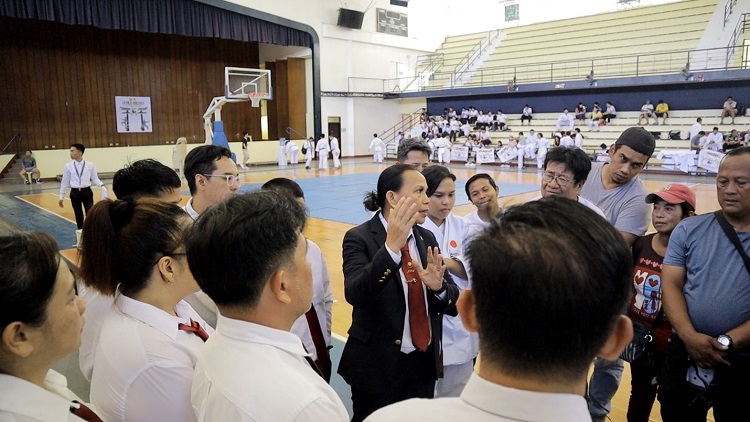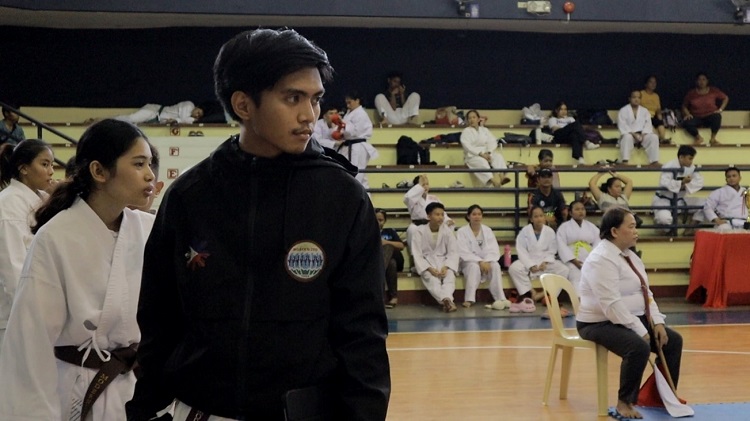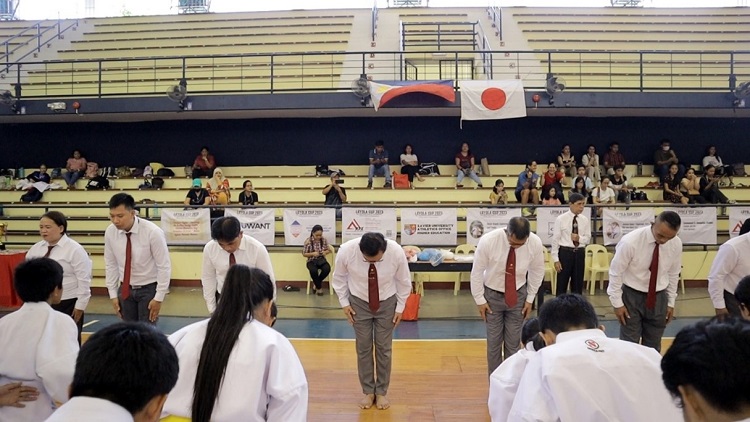Article by: Meckhan Tagarda

[Japan Karate Association Senseis, Shihans, and Modern Sports coaches from different chapters having a quick meeting to discuss and remind the rules and regulations of the tournament for both traditional and modern sports to meet halfway. | Photo by Meckhan Tagarda]
“Seek perfection of character” — the motive from the shared values of both styles that resulted from the echoing halls of Xavier University – Ateneo de Cagayan, the spirit of the martial art ‘Shotokan Karate’ ignited as the Loyola Cup 2023 brings forth an impactful comeback last 3 December, Sunday.
A convergence of all shotokan karate practitioners from different chapters in Northern Mindanao, ready to embody the essence of the first style as it echoes from the execution of the crisp snap of every kata and kumite performance — a celebration of the martial art where tradition meets competition — a testament for the practitioners of the enduring legacy of Gichin Funakoshi, the founder of Shotokan Karate.
“Constantly reheat the fire,” asserted by Sensei Jessica Esparrago, the Director of the University Athletics Office of Xavier University – Ateneo de Cagayan, and the Shihan of Xavier University’s Japan Karate Association.
The Loyola Cup 2023 has successfully invited 12 shotokan karate chapters from Cagayan de Oro, Tagoloan, and Iligan City, to compete for one big cup.
“We are not just there to educate the instructor, but also the players, audience, and the spectators during the tournament,” she said. There are two types of tournaments, the traditional and the sports, and there’s a different point system. Ang result, versatile ang bata, naa na silay idea.”
Sensei Jess from the Xavier University – Japan Karate Association is the founder of the Loyola Cup that was created on the year 2017.
“…Before man jud kay it wasn’t well-known ang tournament, ang gi mention kay JKA lang sya, we [then] opened it to all Shotokan. The Loyola Cup was able to appreciate the sports side of Karate. Tradition and sports.” mentioned by Jheskay Esparrago — the daughter of Sensei Jessica Esparrago, a blackbelt and the current President of Xavier University’s Japan Karate Association.
After the great pause due to the pandemic, the University of Athletics Office of Xavier Ateneo hosted the tournament this year. This time, another all-shotokan competition where the freshly produced old-fashioned meets the new-born contemporary shotokan karate practitioners.
When the Loyola Cup opened its doors to the sports karate in the year 2019, it began an impactful change in the shotokan karate community.
The Striking View from the Modern Sports Karate

[Senpai Angel Pangilinan and Senpai Ailyn as they observe each kata and kumite execution to strategize on how to win the game. | Photo by Meckhan Tagarda]
“Isa na sya sa gina look forward sa Mindanao… Maka learn jud ko ug lahi nga style sa Karate bitaw, and lahi pud nga rules sa tournament.” mentioned Angel Pangilinan — a 20-year-old sports Karate purple belt from the Modernized Martial Arts Academy Incorporated
Angel has won a gold medal in Kumite (aged 18 above category), and a silver medal in Kata (aged 18 above category).
“There are times na if mag participate mi sa traditional tournament, dili mi makurat nga kanang mapildi mi, kay we know that lahi ilang rules and we need to adjust,” said Ailyn Amparo — the 19-year-old sports karateka brown belter — having won a silver medal in kumite, a bronze medal in kata, and gold medal in team kata in the 18-above category.
Both players, Ailyn and Angel, have been competing together since Batang Pinoy, a category of karatekas for people aged 17-below. From their lens comes a different alliteration of the language in shotokan karate, but their experiences prove that both styles do not rhyme.
“Ang host is JKA man, so traditional,” said Sensei Jimmy Asiñero — a 55-year-old sports karate black belt from the Modernized Martial Arts Academy Incorporated of the Municipality of Tagoloan.
“Gi sagol ang karate sports para at least kabalo mo adjust ang karate players,” he said. “Kailangan mo follow sa rules and regulations sa host. At least [kung] kabalo ka mo follow, mo adjust, kabalo jud ka how to play the game.”
“The respect to the opponent, win or lose, makita nimo nga […] the art of fighting, without a fight after. Sportsmanship, then point system,” concluded by Sensei Jess, from her point-of-view for both styles to cooperate.
Part of the challenges of the Senseis in Shotokan Karate, is to acknowledge and learn both styles for their students to be versatile. Competing in different tournaments is one way.
“What makes the traditional and sports different, is that tradition focuses on one strike, and it is considered a win,” according to Sensei Jess as she explains the difference between traditional and modern sports karate.
Karate Begins and Ends with Rei (Bow)
The Loyola Cup is an avenue for both styles to collide, despite its differences, traditional and modern karate can co-exist as long as there is mutual respect.

[Senseis, shihans, and senpais bowing to each other as a sign of respect before the tournament commemorates. | Photo by Meckhan Tagarda]
At the end of the tournament, the overall champion of the Loyola Cup 2023 is the Japan Karate Association of Cagayan de Oro City, winning 13 gold medals, 11 silver medals, and 14 bronze medals — a total of 75 points! Followed by the Japan Karate Association of Iligan City with 62 points, and the Japan Karate Association of COC Phinma with 32 points.
Preparing for the next Loyola Cup, current and upcoming practitioners from both styles continue to hone their skills, growing from what they have learned, and sharpening the shotokan tiger in them as they visualize their biggest comeback in the year 2024. The Loyola Cup will continue to be an all-shotokan karate tournament in 2024 as it honors the art of empty hands.